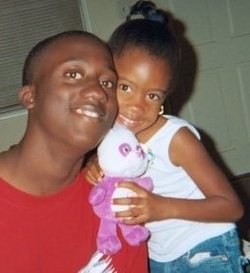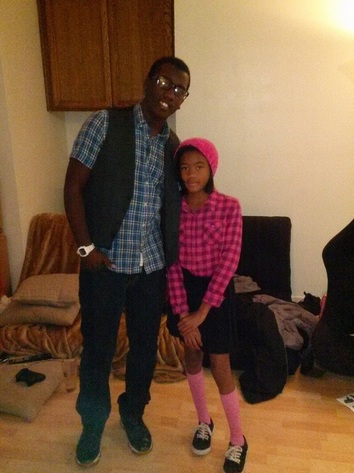
We are in the car on the way to church on a random Sunday morning. I am navigating unusually heavy traffic around a construction project, and the kids are having the kind of free floating conversation that says that they don't really have anything to talk about, but they don't want to listen to the sermon coming from the radio either. As I maneuver carefully between a pickup truck and an SUV while driving over my 1000th metal plate, I catch my son giving a quick synopsis of his week as a student at our nearby Community College. When he gets to an anecdote about an encounter with a group of acquaintances, his voice takes on a tone both miffed and mystified. Somewhere in the middle of a conversation, someone opined that he didn't "act Black" enough.
"Excuse me?"
"You don't sound Black when you talk. You don't dress like other Black people. You're not REALLY Black."
Stopped at a light, I see my daughter vigorously nodding her head in my rear view mirror.
"Yep. I get that all the time. I don't act Black enough."
This is all more than a tad irritating to my son, who is consistently told by another group of people that his dark chocolate brown skin, and broad ethnic features make him "TOO Black", and therefore unattractive.
Who is all of this contradictory criticism coming from? Other Black people.
I want to think that in the 150 years since the end of slavery, and the 50 years since the Civil Rights Movement, and the 40+ years since we declared that Black was indeed Beautiful, somewhere in there we would have learned some level of acceptance of the diversity that exists within the Black community. Some people dropped out of school, some work blue collar jobs, some have degrees and are in upper management. Most will wear whatever they are comfortable in be it jeans, slacks, dresses or whatever works for them, and although many professional Blacks have mastered the art of the code switch depending on the environment, that can't be said for every Black person you meet. Nor should it.
I find it ironic that as hard as we fought for the freedom to be ourselves, and exist the way we saw fit, the unspoken mandate to conform to the popularly accepted quasi-ignorant stereotype, so long as you're physical appearance hews as closely as possible to a generic European standard, is counter-intuitive at best, and completely self destructive to the very community that upholds it at worst. What I tell myself, in order to keep my blood from boiling when one of the kids comes home with yet another taunt of Looking Too Black while not Acting Not Black Enough, is that some folks take comfort in these given roles because that's all they know, and the idea of not fitting in to their surrounding community is completely unacceptable to them. Intra-racial politics occasionally shows the herd mentality at it's very finest, forcing anyone that dare attempt individuality back into their proper place in line on pain of being ostracized by the group until they do.
I know that game well. In April of last year, I went into a long detailed post about the definition of ugly, and not conforming to beauty standards. My brown skin, super coarse, unruly hair, painfully skinny build, and incredibly broad, clearly ethnic features did not play well in the 80's, when according to popular media at the time "Light skin was IN", and bi-racial women with long, soft hair, and slight curves were considered the ideal in the corner of South Los Angeles I lived in. Knowing that I was never going to conform to the physical ideal, I set about trying to fit in by imitating the behavioral ideal, mimicking the speech patterns, language and behavior of those who seemed (to my mind, anyway) to have the most friends, while continuing the battle to force my hair into submission. I had already developed a studious appearance for the teachers, standard issue middle child look for my family, and the mostly laid back smart ass for my friends (mastering code-switching before it had a name). Like so many others in my working class world, I tried to find just the right amount of Black (the correct ratio of attitude/personality to physical appearance) in order to be accepted both inside, and later outside, my little world.
Of course it took me years to realize that the Southern California aesthetic is not always true of the rest of the country, and almost all Black people will confront the contrary Too Black/Not Black Enough looks/behavior issue at some point in their lives. And it will more than likely come from another Black person. Which is unutterably sad. If we spent half as much time putting our energy into supporting each other, in spite of our differing appearances and approaches to life, as we do trying to make sure that all Black people balance on our own personal Blackness meters, I dare say we might finally begin to seem a little more united, instead of constantly being torn apart by infighting and subtle condescension.
But a Black community unified across differences could be considered dangerous, so we had better stick to sniping at each other over petty differences, rather than attempting to uplift the hurting and hopeless, and lending a helping hand to those who might not receive advice or assistance any other way. And you KNOW we can't have Black people working together to improve their own communities, as it upsets the popular perception of the majority of Black people as hopeless messes, no matter how hard they have worked, or how much they have achieved. What a wonderful world it will be when being Black no longer has a specific, narrow definition, and we are all finally free to be whatever we are, including what we look like.
If the comments on articles by or about Black people are any indication, we are a long way away from this ideal. In the mean time, I will keep reminding my dark brown son, and my light brown daughter with the 4c hair that resists all but the attentions of a professional to tame it, that their looks and definitively not "urban" personalities are perfectly fine. They got them honestly, as it took me many years to learn that everybody is coming from a different place and set of experiences, and it is simply easier to accept that not everybody is going to think, act or look like you, and to at least try to give people the benefit of the doubt. (Unless we are talking about liars, thieves, or people whose negativity is persistently draining. Those people need to be cut loose.) The way I figure, if I can add two less people to the Too Black/Not Black Enough game, I've done some unusual Black kid somewhere a small favor by taking away another person that will make fun of him or her for being different from the norm.
Baby steps are still steps.

 RSS Feed
RSS Feed
